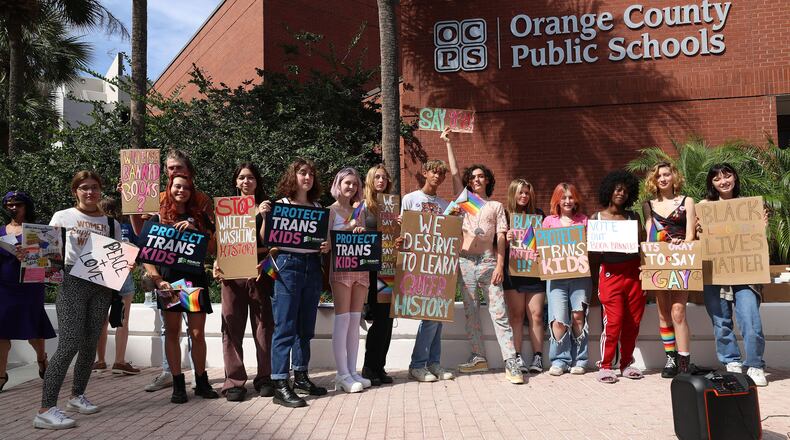Retired Fulton County teacher Randy Fair is author of the memoir “Southern. Gay. Teacher.” In this guest column, Fair talks about the impact of “Don’t Say Gay” laws on teachers.
By Randy Fair
An award-winning teacher from Georgia contacted me recently with their fears of being fired over a pretty innocuous activity allowing students in the Gender and Sexuality Alliance club to express their gender. When students excitedly posted about the activity in their Instagram account, apparently someone with a conservative outlook was offended. Very quickly, the teacher was called in by the leader of human resources and threatened.
If Georgia Senate Bill 88 passes, this situation would only get worse. In a GSA club. such as the one this teacher sponsors, students under 16 would be unable to discuss their gender identity with the sponsor unless their parents gave consent.
For a student who is coming to terms with who they are, being unable to discuss that identity with a trusted adult would only cause further isolation. Rather than solving a problem, this bill would only serve to further the already tremendous challenges transgender and gender-nonconforming young people face, including the high rate of suicide.
Although I no longer live in Georgia, I am very familiar with these new assaults on LGBTQ people. I now live in Florida, the center of attacks on LGBTQ people and people of color in the school system. The teacher who was threatened was a reminder for me that while most of the focus on the recent proliferation of “Don’t Say Gay” laws and “Anti-Woke” laws in schools has focused on students, very little attention has been mentioned about the harmful effects of these laws on teachers.
Florida’s laws and laws being modeled after them are so vague that most teachers have reason to be fearful. A book about the life of Roberto Clemente offers a stark example. Because the book mentions the discrimination Clemente faced as an Afro-Puerto Rican baseball player, the book was pulled from the shelves along with a million other titles in the Duval County Public Schools District as school officials work to determine if the books comply with state laws.
My niece, an award-winning librarian and a white, cisgender, heterosexual, evangelical Christian, expressed her dismay. She reported that at a mandatory training covering the new laws in Florida, the presenters pointed out that any librarian could face being charged with a third-degree felony if someone considered a book chosen by the librarian as “harmful to minors.” As she said, “This is my life now. Fight to be sure that all kids are seen while also trying not to go to jail.”
I can understand the fear my niece is experiencing because I lived with that same fear every day of my 31-year career as a gay teacher in the Deep South. I began teaching in 1986, and at that time, my very existence in this country was a criminal offense. Like the teacher who was called in by the leader of the human resources department, in the ’90s, I was threatened with “termination or transfer” when I began writing a column for Southern Voice, an LGBTQ publication.
Since I was a writing and literature teacher, many might have thought my columns to be a great example of practicing the craft I was teaching. However, since the publication was primarily for LGBTQ people, to some in the school system that was grounds for immediate termination. The irony is my silence probably wouldn’t have protected me. Even without my writing the column, many felt that my presence was unwanted.
What some people fail to realize is LGBTQ teachers and teachers of color are a threat to the status quo by their very existence in the school system. During the height of my ordeal, I turned to a book by Karen Harbeck, “Gay and Lesbian Educators: Personal Freedoms, Public Constraints.” What I learned from this book is that most LGBTQ teachers are faced with threats of being fired at some point in their career. The school system rarely follows through with these threats, but the threat alone is usually enough to silence the teacher.
I know from experience that it is hard to get anyone interested in the plight of teachers in general. It is almost impossible to get people to understand and care about the problems faced by LGBTQ teachers and teachers of color.
This lack of empathy is shortsighted. The only way most students will achieve is through the hard work of teachers. From my observations over the years, the perilous situation that LGBTQ teachers and teachers of color find themselves in makes them strive even harder to do work that is beyond reproach.
In addition to that, students benefit greatly from seeing someone like themselves in a position of authority. It has been many years since I retired, and I still get messages with some version of this statement, “knowing your presence as a gay teacher in the school was drastically important for me as that year was at an incredibly pivotal time in my life discovering my own identity as being gay. I heavily struggled to cope with it, but knowing of a teacher within my own school who was openly gay and living a full and happy life within this incredibly heteronormative world greatly helped me embrace who I am.”
I’m always touched, but never surprised when I get one of these messages. My own teachers did the same for me when I was growing up in the ‘70s in Weaver, Alabama. Although these teachers were straight, their willingness to go against the conventional beliefs of the day gave me hope for a brighter future.
In fact, I feel that I can definitively state that my teachers and my love of books were responsible for lifting me out of poverty and helping me lead a happy, productive life. I feel strongly that many students won’t have that same opportunity unless we counter these attacks on teachers, counselors and librarians.
About the Author



